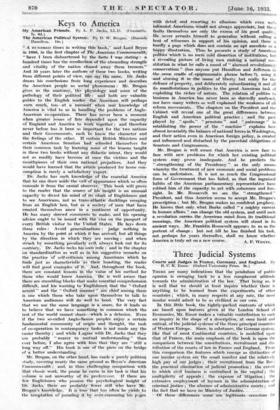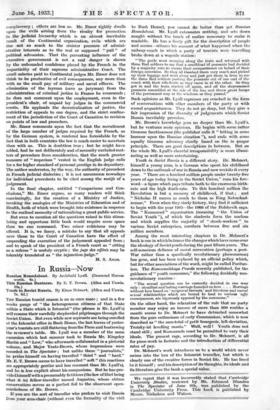Three Judicial Systems
Courts and Judges in France, Germany, and England. H. C. K; Ensor. (Oxford University Press. 6s.) •
THERE are many indiCations that the 'pendulum of public opinion is swinging back to a less complacent attitude towards the administration of the law. That being so,, it is well that we should at 'least inquire whether there is anything to be learned from the experiments. of other countries ; which, in many respects at any rate, the "most insular would admit to be as civilized as our own.
In this little book, the tightly-packed contents of which are based- upon lectures given at the Londsin • School of Economics, Mr. Ensor makes a valuable contribution to such an inquiry in the shape of a description,' at once lucid and critical, of the judicial systems of the three principal countries of Western EUrope. Since, in substance, the German system, like that of most Continental. countries, is modelled upon that of . France; the main emphasis of the book is upon the comparison between the constitutions, recruitment and dis- tribution of the courts of law. in France and England. From this comparison the features which emerge as distinctive of our insular system are the small number and the relatively high pay of our judges ; their recruitment from the: Bar ; the practical elimination of 'judicial promotion ; the extent to which civil business is centralized" in the capital ; the multiplicity of appeals ; the expense of -litigation ; the extensive employment of laymen in the .adminiStration of criminal justice ; the. absence of administrative courts ; and the fact that we have no Ministry .of Justide. 1
- Of these - differences some - are legitimate occasions for
complacency ; others are less so. Mr. Ensor rightly dwells upon the evils arising from the rivalry for promotion in the judicial hierarchy which is an almost inevitable result of the Continental organization, evils which are due not so much to the sinister pressure of admini- strative interests as to the real or supposed " pull " of political advocates. That the perverting influence of the executive government is not a real danger is shown by the unbounded confidence placed by the French in the impartiality of their supreme administrative Court. The small salaries paid to Continental judges Mr. Ensor does not think to be productive of evil consequences, any more than with us the small pay of military and naval officers. The elimination of the layman (save as juryman) from the administration of criminal justice in France he commends ; be does not comment upon the employment, even in the president's chair, of unpaid lay judges in the commercial courts. He applauds the decentralization of justice, the restriction of appeals to one degree, and the strict confine- ment of the jurisdiction of the Court of Cessation to revision on points of law and procedure.
Mr. Ensor comments upon the fact that the recruitment of the large number of judges required by the French, as by the German system, is rendered less formidable by the fact that in both countries the law is much easier to ascertain than with us. This is doubtless true ; but he might have added, had he not deliberately and of necessity excludedmat- ters of procedure from consideration, that the much greater measure of " imperium " vested in the English judge calls for a far higher standard of personal prestige in its depositary. The author underrates, by the way, the authority of precedent in French judicial dialectics ; it is not uncommon nowadays for individual precedents to be cited among the motifs of a judgement.
In the final chapter, entitled " Comparisons and Con- clusions," Mr. Ensor argues, as many readers will think convincingly, for the creation of a Ministry of Justice, invoking the analogies of the Ministries of Education and of Health, both of which were brought into existence in response to the realized necessity of rationalizing a great public service.
But even to mention all the questions raised in this stimu- lating and opportune little book would require more space than we can command. Two minor criticisms may be offered. It is, we fancy, a mistake to say that all appeals save those to the Court of Cessation have the effect of suspending the execution of the judgement appealed from ; and to speak of the president of a French court as " sifting as a referee " is unduly cryptic ; the juge des referds may be tolerably translated as " the injunction-judge."
M. S. Amos.











































 Previous page
Previous page